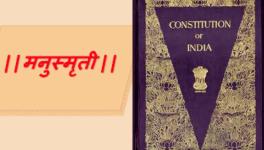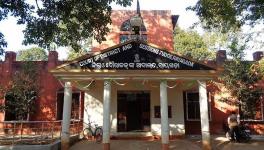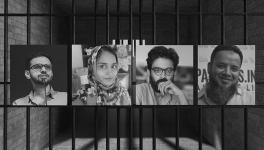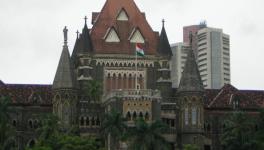Tunisia to Vote on Constitution Seen as Democratic Threat
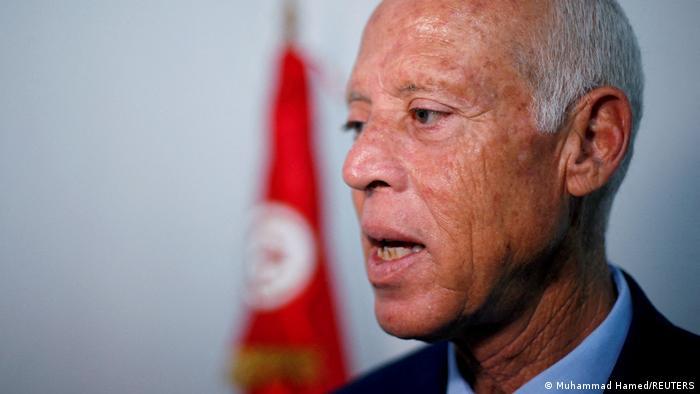
President Kais Saied has been accused of taking Tunisia back to one-man rule
Tunisians will finally get the opportunity to vote on their new constitution on Monday. But the process has been criticized for being far from democratic.
The country's president, Kais Saied, has been working on the new constitution for several months. A draft was published in the country's official gazette a few days ago.
It provides a clear vision of the direction Saied wants Tunisia to take. It very clearly strengthens the powers of the president, and weakens institutions that would otherwise provide a balance of executive powers.
The proposed constitutional changes have worried many pro-democracy activists and observers.
One-man rule?
The draft constitution continues the course Saied has pursued since he declared a state of emergency in July 2021, froze the elected parliament and dismissed the sitting prime minister, Hichem Mechichi.
Saied, a former law professor, denied at the time that he was taking power in what critics have described as a "constitutional coup."
But then, in February, Saied also dissolved Tunisia's Supreme Judicial Council, the national body that is supposed to ensure judicial independence.
In March, he dissolved the suspended parliament altogether and at the beginning of June, dismissed 57 judges and prosecutors.
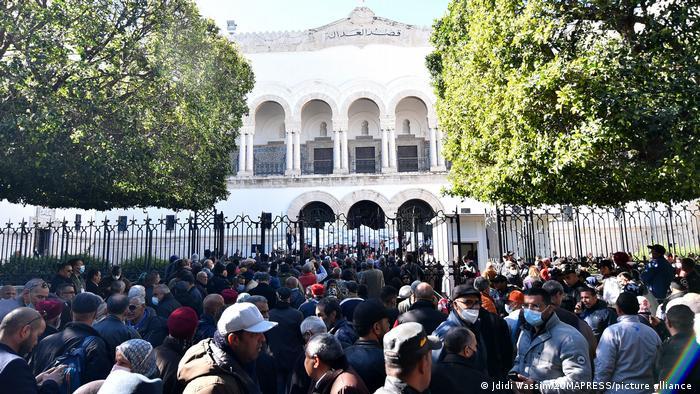
Tunisian judges went on strike for several weeks after the suspension of their oversight body, the Supreme Judicial Council
The draft constitution that will be presented to the Tunisian public next week was supposedly formulated in a legitimate and democratic way that allowed ordinary Tunisians to submit suggestions online. However, only around 6% of Tunisia's 9 million eligible voters took part in the digital process.
Some supporters optimistic
Still, despite all the concerns about their president's apparent increasing autocracy, the draft constitution has been well received by some parts of the population, according to Heike Löschmann, the head of the Tunis office of the Heinrich Böll Foundation.
However, she said, there are significant differences between how people in the urban centers and rural areas view the proposed amendments.
"Across the country, people — especially in rural areas — see their institutions as corrupt. They hope that the president will take action on this," Löschmann said. "Saied's public speeches, in which he promotes the constitution, are also well received because they often accurately outline the country's ills."
“What’s improved most in your own life since July 25?” I asked a Kais Saied supporter who helped run his 2019 presidential campaign in #Gafsa. “Saied gave hope to all Tunisians,” he said, tears welling up in his eyes. “He achieved a dream no one could achieve for generations.”
— Monica Marks (@MonicaLMarks) July 16, 2022
But Tunisians in larger cities, particularly in the capital, Tunis, are more skeptical, she added.
"They are less likely to be won over by the 'strong man' rhetoric and they fear that the rule of law is being undermined. They are also worried about the loss of democratic freedoms," she said.
'Complete control'
Lawyer and human rights activist Bochra Belhaj Hmida is one of those who is concerned.
"Of course this constitution is a threat to democracy," Hmida said. "We see all the achievements of the [Arab Spring] revolution being called into question, things like freedom of speech and freedom of association."
An independent judiciary and the human rights situation in Tunisia is also endangered, Hmida added.
The president had consulted a group of legal experts on the draft constitution. At the end of May, however, Saied made further amendments to the experts' draft. These additional changes could possibly allow for the suspension of Tunisia's nascent democracy and overturn the rule of law, analysts have said.
The amendments that define the president's role indicate "complete control over the state apparatus," Julius Dihstelhoff and Mounir Mrad, political scientists at the Tunis-based Merian Centre for Advanced Studies in the Maghreb, wrote this month in an analysis published by the Frankfurter Allgemeine Zeitung, a German news site.
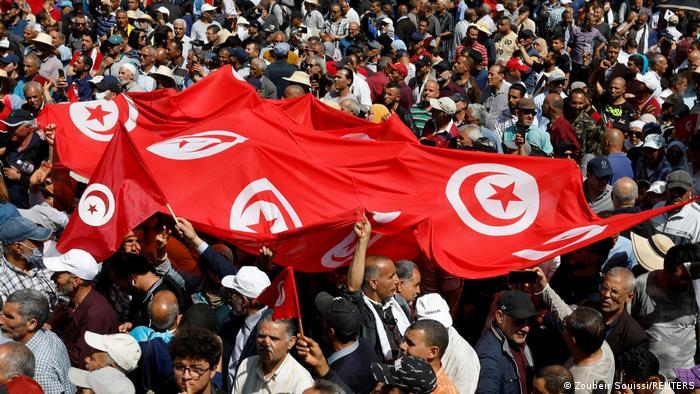
Tunisians have held protests against what some have called Saied's 'constitutional coup'
There are several ways that this is manifested. The Tunisian president has a head of government, such as a prime minister, by his side, which theoretically would offer some sort of executive balance. However, this position is appointed by the president, not the country's elected parliament.
Additionally, under the new constitution, regional commissions would decide who can be a member of parliament, as opposed to political parties; Saied has been highly critical of Tunisia's competing political parties.
The judiciary would also lose any semblance of independence as the nine members of the country's highest court, which would supervise local judges instead of the abolished Supreme Judicial Council, would be appointed by the president.
All subject to Saied's will
Article 55 of Tunisia's new constitution has also been seen by some as controversial, even though it is mostly similar to the old constitution. It says that no restrictions will be put on rights and freedoms "except by virtue of a law and for the necessity of national defense or public security."
This wording is problematic, said Löschmann of the Heinrich Böll Foundation, "because the president could come up with new laws at any time and change the legal framework."
"Experts and informed citizens now fear the way this legislation is worded means it could largely be subject to the president's political will," she said.
Tunisian lawyer Hmida believes the new constitution revokes the separation of powers and removes checks and balances in the system.
"All powers are in the hands of the president," she said. "He controls everything. It is a presidential regime legitimized by the constitution."
Sidelining political opponents
The draft constitution includes other controversial aspects. For instance, it says Tunisia is part of "the Islamic nation" and that the state must work to achieve "the goals of pure Islam in preserving life, honor, money, religion and freedom."
Those efforts must be part of a democratic process, the constitution says.
A phrase from the previous constitution, which defined Tunisia as an Islamic state, has been removed.
This new wording is very likely Saied's attempt to appeal to supporters of the Ennahda party, which has previously been one of the most popular parties in the Tunisian parliament. Known as a party with Islamist principles, Ennahda had been opposed to Saied, and the president has tried hard to combat Ennahda's influence.
"The whole time Saied had actually been giving the impression that he was opposed to Islam [in politics]," said Löschmann. "Many of the more secular Tunisians believed him. But now the state is supposed to be guarding the development of Islamist principles. That's a dangerous project of identity politics."
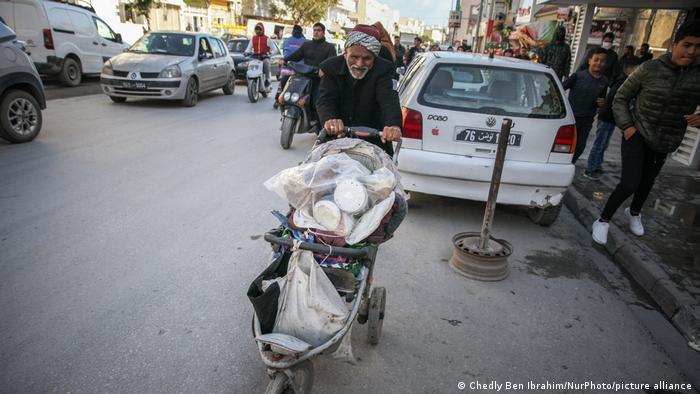
Many Tunisians hope that Kais Saied can solve the country's economic problems, even if he must do so by decree
As for political scientists Dihstelhoff and Mrad, they concluded in their analysis that overall, the new constitution provides for a whole new model for governing Tunisia — one that "sets the framework for the return of an authoritarian presidential system."
"It is reminiscent of the dictatorships of Tunisia's past," they wrote.
For these reasons, Tunisia is rapidly becoming a subject for concern in the European Union.
"Germany and other EU states have an interest in seeing Tunisia remain a stable state between Libya and Algeria, not least because of problems with refugees crossing the Mediterranean from those coasts," said Löschmann.
For a long time, Tunisia was the only Maghreb country that was still being described as a success story after the Arab Spring demonstrations that first started in 2011.
It is becoming increasingly difficult to see how much longer such a description will be accurate, analysts say.
With additional reporting from Tarak Guizani in Tunisia.
This story was originally published in German.
Get the latest reports & analysis with people's perspective on Protests, movements & deep analytical videos, discussions of the current affairs in your Telegram app. Subscribe to NewsClick's Telegram channel & get Real-Time updates on stories, as they get published on our website.










